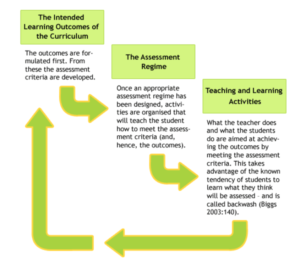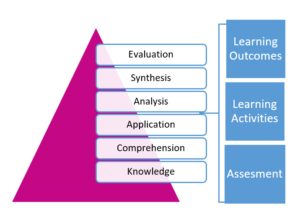What is Constructive Alignment?
Constructive alignment is an approach to learning, teaching and unit/course design that views learners as fundamental in constructing their own learning, rather than learning being primarily the transfer of knowledge from the teacher to student (Biggs 2014).
This approach holds that learning occurs through students’ interaction and engagement with unit/course content and with each other, rather than from what the teacher conveys about the content, to the students. Constructive alignment, meanwhile, occurs when the learning activities that students engage in help them to develop the knowledge, skills and understandings intended for the course/unit and measured by our assessment. A constructively aligned unit capitalises on the powerful effect of assessment on students' learning experiences and the feedback provided to them from formative learning. Assessment drives students' learning. Students are most likely to achieve intended learning outcomes if the assessment is aligned explicitly and intentionally with the important skills students are meant to acquire.
How to Promote Constructive Alignment?
- Identify intended learning outcomes
- Design assessment tasks that can measure attainment of the learning outcomes
- Plan learning activities to enable students to develop the skill and knowledge that support the intended learning outcomes
- Choose content (eg. topics, resources, materials) that supports the learning activities
If there is strong alignment between these elements then it is possible to use assessment tasks to measure the learning that has taken place.

Tools
Bloom's taxonomy (Anderson & Krathwohl, 2001) provides a useful tool for ensuring alignment. For individual assessment tasks, the revised taxonomy can be used to align the knowledge to be learned with the process used to learn. It can also be used at a more holistic level. For example, unit outcomes can be plotted out on the taxonomy, ensuring that all levels of the cognitive process are used and that students learn different types of knowledge.

